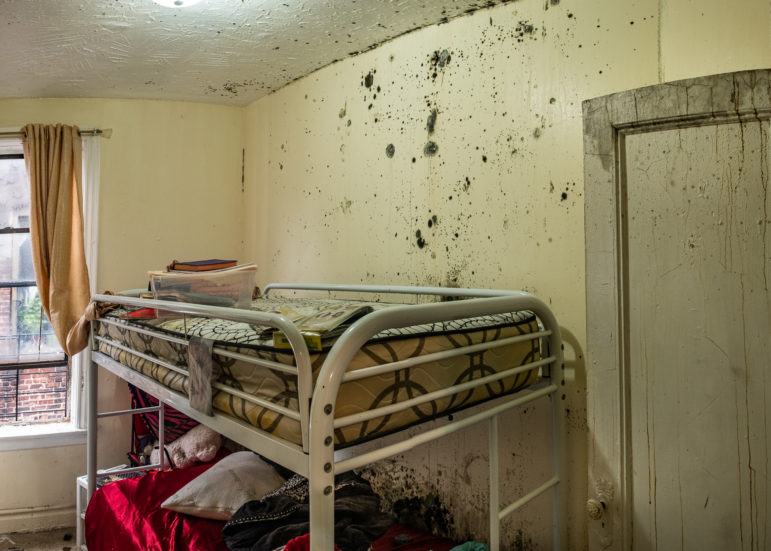“In 1890, Jacob Riis photographed and documented the inhumane conditions of tenements in New York City: the lack of light, air, space, and basic sanitation. Today, 132 years later, much of New York City’s housing stock is still bad: unsafe water, broken elevators, mold, lack of heat, roaches, and rats.”

Adi Talwar
Black mold-infested room in a Washington Heights apartment.“Long ago it was said that ‘one half of the world does not know how the other half lives.’ That was true then. It did not know because it did not care. The half that was on top cared little for the struggles, and less for the fate of those who were underneath, so long as it was able to hold them there and keep its own seat.”
In 1890, Jacob Riis photographed and documented the inhumane conditions of tenements in New York City: the lack of light, air, space, and basic sanitation. Today, 132 years later, much of New York City’s housing stock is still bad: unsafe water, broken elevators, mold, lack of heat, roaches, and rats.
To be fair, many things have improved for tenants since the 1890s. Rent regulation, strengthened in 2019, protects hundreds-of-thousands of tenants from arbitrary rent increases, provides lease renewals, and allows succession rights to leaseholds. NYCHA, a massive system of public housing and housing vouchers, provides or enables access to housing for more than 500,000 of the most vulnerable and lowest-income New Yorkers.
And most relevant to what Riis documented, the Housing Maintenance Code and the Multiple Dwelling Law established basic standards for health, safety, and habitability of apartments. Finally, today, tenants have access to free legal counsel in eviction cases, altering the balance of power between landlords and tenants.
Unfortunately, despite these regulatory changes, the plight of tenants in New York City remains dire. Most tenants in New York City are “rent burdened,” which means they pay too high a percentage of their monthly income towards rent, leaving them vulnerable to displacement and anchored to cheaper and badly-maintained housing.
Health and safety are far from guaranteed in New York City’s housing. In January 2022, 17 people died in a preventable fire at the Twin Parks North West apartment complex in the Bronx. Basic safety measures, like self-closing doors, were left unchecked, allowing a small fire to spread across a building, suffocating people far away from the source of the fire. Also, studies revealed that during the Covid-19 pandemic those who lived in substandard housing were more vulnerable to the health impacts of the disease. Similarly, high asthma rates in children are linked to substandard housing.
Recently, and ironically, an arsenic scare hit NYCHA’s Jacob Riis Houses. Elsewhere, NYCHA tenants continue to suffer through broken elevators and other serious conditions, even as the city implements new policies to fix public housing apartments, like “RAD” and “Blueprint.” Many remain skeptical of models based on private management of public housing, arguing, for example, that disabled tenants will be worse off. Human Rights Watch contends that private management will result in more evictions and no long-term improvements in housing conditions.
Lastly, as courts push to clear their dockets, the resulting surge of eviction cases in Housing Court has meant an overburdened and understaffed public-defender corp. Legal services providers are valiantly fighting to meet the needs of every tenant facing eviction in court. Organizing groups are rightly focused on forcing the courts to properly manage housing court filings and in stemming an eviction crisis through pending legislation like “good cause eviction.”
As such, the fight for quality housing remains an issue that tenants are largely fighting outside of the courts. There are opportunities for the legal community, through pro bono legal assistance, to help bridge this representation gap for repair cases, but such efforts are in their nascent stages. There is also a “clean hands” bill pending in the state legislature, which would require landlords to cure outstanding housing violations before commencing eviction proceedings against rent regulated tenants, but this bill has stalled.
JustFix, a nonprofit based in New York City that focuses on housing conditions and data, has found that the corporatization of the landlord business has hurt tenants. Our analysis of property ownership, housing violation data and court filing, revealed that while fewer tenants filed complaints about housing conditions and harassment issues during the pandemic—perhaps due to fear of retaliation or of contracting COVID from inspectors—housing conditions remain a major concern for tenants. We have also observed the challenges and obstacles faced by tenants, such as filing fees and signature notarization requirements, who have struggled to commence cases for repairs against their landlords.
International human rights law includes the right to adequate housing, which is foundational for “human dignity, physical and mental health and overall quality of life.” Unfortunately, the United States does not ascribe to these principles. For tenants in New York City and in most other places, these basic rights are unmet.
We need more vigilant enforcement of housing maintenance laws, stricter penalties for non-compliance, licensing of landlords, and more transparent data about housing quality and housing maintenance. Decent housing is a quality of life issue, a public health issue, and can be an issue of life and death. We must use every available tool to act to preserve, protect, and maintain housing quality as a fundamental right.
Sateesh Nori is the executive director of JustFix








